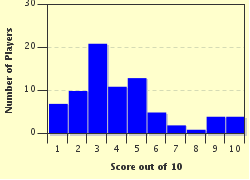Quiz Answer Key and Fun Facts
1. Time travel has frequently appeared in "Star Trek" (1966) and all its subsequent incarnations. In the Original Series, Kirk (William Shatner), McCoy (DeForest Kelley) and Spock (Leonard Nimoy) all travel back to 1930s America. But what time travel theory underpins the plot?
2. "Doctor Who" has been time-travelling on the BBC for over 45 years. The Doctor can travel throughout the universe but frequently comes back to Earth in the present, past and future. In the 2005 revival what is the Doctor's attitude to time changes?
3. In "Frequency" (2000), John Sullivan (Jim Caviezel) is a police officer who starts talking to his father (Dennis Quaid) via radio, even though his father died 30 years previously. By the end of the movie, what are the apparent effects of this vocal time travel?
4. "Quantum Leap" (1989) showed the adventures of Sam Beckett (Scott Bakula), a time-travelling scientist who was trying to "put right what once went wrong". Dean Stockwell played Al, a hologram from the future who kept Sam (and us) in touch with the results of his changes. In one historic episode, Sam became Lee Harvey Oswald - but what effect did he have on history as we know it?
5. In "Back to the Future" Marty McFly (Michael J Fox) time-travelled to 1955 and accidentally changed the future. He scrambled to correct his mistake and try to reinstate the present he remembered. In "Back to the Future II" he returned to the same time with what effects?
6. At the start of the fourth season, "Eureka" sent several characters back to the town of Eureka in the 1940s when it was just getting started. When they return to the present day, how has the present been affected?
7. In the "Warehouse 13" episode "Where or When", Pete (Eddie McClintock) and Myka (Joanne Kelly) use H.G. Wells' time machine to travel back to 1961 where they become Warehouse agents Rebecca and Jack. The plot supports one popular theory as to the effects of time travel - what is it?
8. The "time-loop" storyline is another popular idea, where one or more characters repeat a given period of time. The most famous example is probably "Groundhog Day", but it is also depicted in "12:01" and the "Stargate: SG-1" episode "Window of Opportunity". According to all these stories, what is the only thing you can take with you through time-travel?
9. The Kennedy assassination is popular territory in time travel stories. In one episode of "Red Dwarf" (1988), Lister (Craig Charles) and the crew drop into Dallas in 1963. What is the main thrust of this time travel adventure?
10. The 2009 "Star Trek" movie intended to re-boot the franchise also deals with time travel. The time travel theory happening here is one of the most popular with storytellers, perhaps because it makes writing their tales easier. What is it?
Source: Author
DragonLadyBlue
This quiz was reviewed by FunTrivia editor
kyleisalive before going online.
Any errors found in FunTrivia content are routinely corrected through our feedback system.

